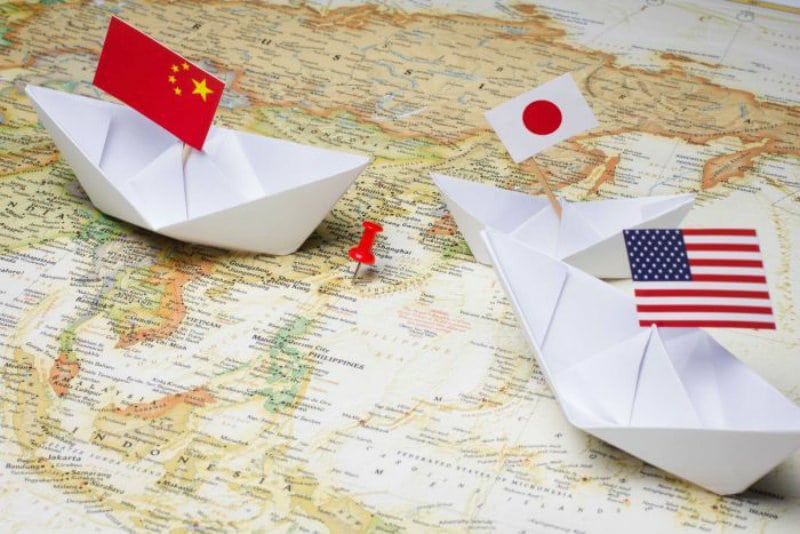
The South China Sea is yet another vortex Chilean foreign policy will have to tackle. The area had been the object of desire of ancient China already, as it connects wealthy Asian markets and contains vast natural resources. Western colonialism, however, ended China’s aspirations and the European empires did as they pleased there until 1945. Afterwards, the remaining superpower began policing the South China Sea to protect the sea lanes so vital for the economic system of Pax Americana. Washington enjoyed such leeway because China was still suffering the aftermath of colonialism and Japanese invasions, and later the gruesome Cultural Revolution. Japan, the other potential contender, had the bomb weighing on its psyche.
In that time, U.S. hegemony grew on a dilemma: U.S. capitalism worked best globally, but no strong enough economy ancient China already to trade with existed. Therefore, West Europe received money aid, while anti-capitalist experiments elsewhere received coups d’état, invasions, or subversive ‘civil society’ initiatives. So, the geopolitical system grew on economic interests. Once countries accommodated these interests they fed the US export sector and consumerist society. Profits thus accumulated, however, need to find return into the production process to keep the machine running and increase productivity, which should create yet more profits, or the system could collapse. The South China Sea smooths this process as it allows easy access to markets that absorb goods and provide cheap labour. Yet, U.S. imperialism didn’t go necessarily just one way, so smaller countries like the Philippines and even Vietnam have cherished the U.S. engagement, as they gained foreign investments, access to the rich U.S. market, and a security umbrella saving them security expenditure and further amplifying the economic benefits— all within the parameters of U.S.-defined liberal capitalism.
This was neither an intrinsically benign nor sinister policy, but one of survival. A capitalist economy relies on markets that absorb capital surplus, consumer goods and also provide raw materials and cheap labor to push down investment costs and generate greater profit margins. The South China Sea has all that and more, especially since Mao turned the Cultural Revolution into a capitalist one. The industrial zones of Shenzen or Guangdong, but also the finance hubs of Singapore or Hong Kong, form part of the globally integrated value chains the sea lanes of the South China Sea constantly feed.
This also makes the Sea a tense region as economic prerequisites seep into geopolitical ones there. Specifically, the necessary export and maintenance of capitalism has prepared the ground for future contenders to U.S. hegemony. So far, however, any frictions, especially from Europe, the most potent contender, dissipated in the institutions of the liberal order; hence, the image of a democratic peace. China’s economic evolution, however, alters its position in the global economy and because of its size and related potency, established systemic dynamics change, too. Additionally, Beijing has to face a U.S. president who understands global affairs best in terms of miniskirts.
Thus, China can pierce even easier the interests of its southern neighbors and threaten war if they don’t accede. President Xi Jinping laid out the rationale for this policy in his inauguration speech, bluntly stating that maritime power is key and the rights only of weak countries can be violated. After deploying this rationale against the Philippines, the latter sought refuge in international law, and The Hague ruled in its favor. But Beijing laughed the ruling off and told Philippine President Rodrigo Duterte to forget his country’s resources or face war. Vietnam, on the other hand, had seen it coming in 2011 and held maritime extensive military exercises, but this year recognizing the crumbling security umbrella, Hanoi fell in Beijing’s line, too, after Chinese officials threatened the Vietnamese ambassador with war. Currently, China is imposing a regional order on the phony basis of a ‘Code of Conduct.’ Yet, liberal analysis welcomes such constructs, as they’d help the U.S. and China to find a middle ground, Beijing’s aggressive rhetoric notwithstanding.
This view is delusional. First, because it intimidation, not negotiation, created a Code of Conduct, throwing into doubt China’s commitment to international law and cooperation. Second, China needs Washington to help secure the region, and to retain access to the U.S. economy. Thought the geopolitical system is undergoing change, the economic one is fundamentally not in danger, though it likely turns yet more repressive. China’s regional strategy includes the US goofing around with Freedom of Navigation Operations, as long as Beijing determines who can exploit which resources, which in turn affects the policies of its neighbors more than vice versa. China, just as the U.S. in past, uses its geopolitical/military clout to mold economic development of other countries, thus building up its economy and domestic power base.
China’s neighbors must already ask permission to access their own resources, so the ‘Closer Than Ever’ slogan of Chile Week should give some pause. Chile needs an Asia strategy that considers geopolitical realities as much as economic necessities, and drops the fantasy of equality before the law. The silence on the death of Liu Xiaobo, however, suggests that Chile won’t need pressure to bow. But remember: Weak states don’t have rights!



